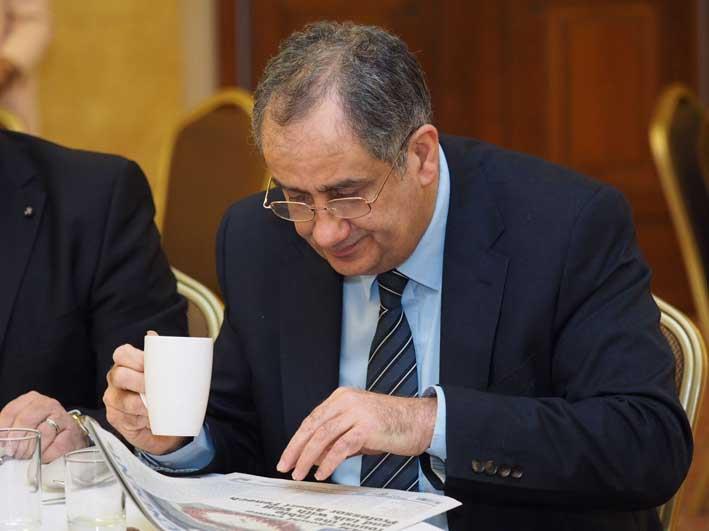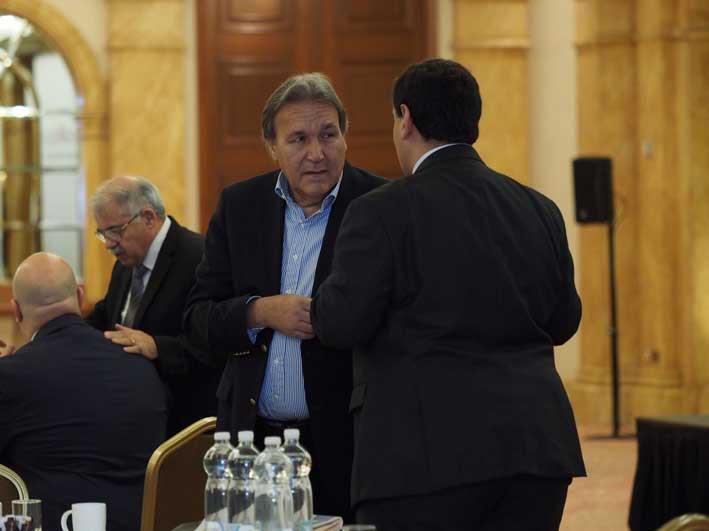The government will soon issue a tender for the formation of a company to chase after third country nationals and recoup money owed for health services, Health Minister Chris Fearne said this morning. he was speaking at a business breakfast organised by The Malta Business Weekly in conjunction with the Health Ministry.
Mr Fearne said third country nationals are not entitled to free healthcare and the government will finally embark on a mission to recoup money it is owed from such people. He also explained how EU nationals are not charged for health services receive in Malta but the Maltese authorities then bill their respective governments.
He was replying to questions by Dr Louis Buhagiar, from St Thomas Hospital, who asked whether the government would revised its NHS funding system seeing that more than 25,000 foreign workers and their families live in Malta.
The Health Minister said Malta wants to attract more foreign patients to its shores, adding that this was the only way in which a quality healthcare system – that remains free for Maltese people – can be sustained.
This was why the government had attracted foreign investors to Malta. He was referring to Vitals Global Healthcare, which now runs St Luke’s, Karin Grech and the Gozo General Hospital. These will offer free NHS services for the Maltese and private services for their own private customers.

“The new hospitals will be better than Mater Dei,” Mr Fearne said, adding that the state hospital would later be made to catch up. “The private hospitals will uphold the best US standards and they will be working with us. All services will remain free for Maltese people.”
Mr Fearne spoke about the time when he worked at Great Ormond Street Hospital in the UK – considered to be one of the best children’s hospitals in Europe. “What made it so great was not the building or the equipment but the people who worked there – the hospital attracts the best people in the business. That is what we want to do here.”
Malta was also making great strides in research but the country needs to attract more facilities of this sort. This is what is happening in Gozo. Another target was for the country to become a centre for medical teaching. The national health system already guarantees a number of placements for university students at Mater Dei but we need other institutions to do the same, Mr Fearne said.

“At the same time we have to keep our feet on the ground and deal with the problems that come our way. One of these problems was the issue of out-of-stock medicines. This problem has been largely dealt with and nowadays only a couple of products would be out of stock, if any. The same could be said for patients in hospital corridors. Today this is the exception.”
The minister said waiting lists have also been decreased because the health authorities are managing to give more in the face of increasing demand. “There is still work to do at the outpatients department. We have to decrease demand by prevention,” he said, noting that obesity costs the country between €45 and €50 million a year. The opening of a new health centre in Kirkop, a regional centre in Paola and several new clinics would also lighten the load on Mater Dei. This has to be complemented with a boost in human resources.

After the minister’s opening speech a team of panels joined in the debate. The panel as made up of MAM President Gordon Caruana Dingli, Mary Ann Sant Fournier, the President of the Chamber of Pharmacists, Engineer Karl Farrugia, the head of the Central Procurement and Supplies Unit and Mater Dei Hospital CEO Ivan Falzon. The debate was moderated by Standard Publications Ltd Content Director Pierre Portelli.
Dr Caruana Dingli said the country had lost the personalised link between the individual or family and the doctor. He stressed on the need for increased education and investment in primary healthcare. Asked if the new hospitals were a positive development and would lead to a higher level of care, Dr Caruana Dingli sad “these are the questions we are asking ourselves,” adding that what MAM wanted was transparency.
Ivan Falzon said one had to make a distinction between a state hospital, with the huge pressures it faced, and the more convenient private sector, but said Mater Dei “meets and exceeds expectations” every day. He said there needs to be greater investment in community-based services.
Mary Anne Sant Fournier said pharmacists wanted to see less waste and more adherence by patients.

Dr Stephen Zammit, CEO of Karin Grech and St Luke’s, who spoke in his capacity as a consultant, said Malta has long been yearning for a proper rehabilitation hospital. This is now happening at St Luke’s hospital thanks to the agreement with Vitals Global Healthcare.
Fielding questions from the floor, Mr Fearne said the Maltese health system is geared towards curing sickness but the time has come for us to start focusing on prevention. Asked if the time had come to introduce a sugar tax, the minister said he believed in education, not imposition.
He spoke on the need for increased efficiency in the procurement of medicines and said that these should, ideally, be taken directly to pharmacies or patients at home. These would save up on storage and transport costs.
MAM Secretary General Martin Balzan, speaking as a patient, said the cholesterol pills he is given on the NHS simply do not work. “It is good to follow procurement rules but we have to ensure that we are buying good quality stuff.”
He also alleged that nurses were demotivated because unqualified persons had been chosen to approve promotions. The best people were not chosen for the job, he said.

The Health Minister rejected these claims, saying that the roles were chosen according to established procedure and by competent persons.
Turning to the medicines issue, Mr Fearne said all generic medicines imported to Malta are authorised by the competent European authorities. “If anyone has any evidence of unauthorised medicine or drugs that don’t work they should report it to the Medicines Authority.”
“If we were to buy brand medicines instead of generics our budget would more than double,” he explained. “In genuine cases where generics are less effective than branded medicines there are protocols for the procurement of the latter. These protocols are being revised, making access easier.”
The CPSU head acknowledged that there were reports of adverse effects from a particular brand of eye drops but said the issue had been addressed.

He also noted that the government had allocated an extra €3 million for the procurement of cancer medicine, which would save people the trouble of going to the Malta Community Chest Fund.
Closing the debate, the Health Minister announced that healthcare professionals will be taught “soft skills” as from next year, and this would improve the overall patient experience. “This will cost us around €3 million but it will be totally worth it.”
He also announced upgrades to the IT system as the health authorities move closer to a system where all medical records are kept on file. And the new myHealth system will be launched in April. This will be more user-friendly and provide more facilities for patients and community doctors.